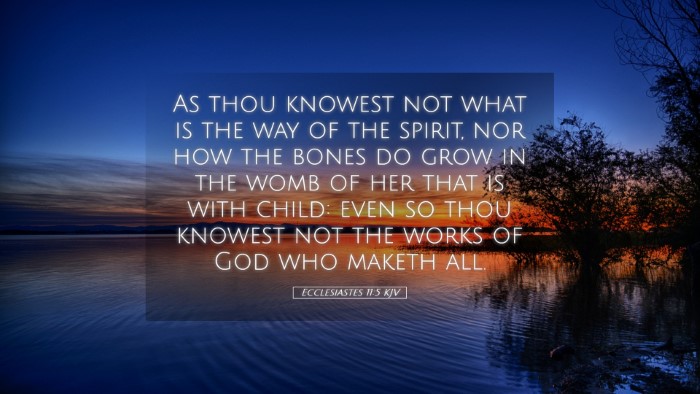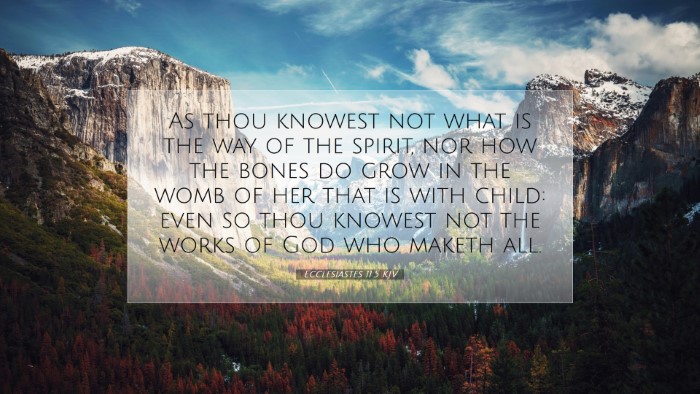Old Testament
Genesis Exodus Leviticus Numbers Deuteronomy Joshua Judges Ruth 1 Samuel 2 Samuel 1 Kings 2 Kings 1 Chronicles 2 Chronicles Ezra Nehemiah Esther Job Psalms Proverbs Ecclesiastes Song of Solomon Isaiah Jeremiah Lamentations Ezekiel Daniel Hosea Joel Amos Obadiah Jonah Micah Nahum Habakkuk Zephaniah Haggai Zechariah MalachiEcclesiastes 11:5
Ecclesiastes 11:5 KJV
As thou knowest not what is the way of the spirit, nor how the bones do grow in the womb of her that is with child: even so thou knowest not the works of God who maketh all.
Ecclesiastes 11:5 Bible Commentary
Commentary on Ecclesiastes 11:5
Ecclesiastes 11:5: “As you do not know the path of the wind, or how the body is formed in a mother's womb, so you cannot understand the work of God, the Maker of all things.”
Introduction
The book of Ecclesiastes presents profound reflections on the nature of life, the limitations of human understanding, and the sovereignty of God. Ecclesiastes 11:5 encapsulates these themes, highlighting the mystery of creation and the divine workings that lie beyond human comprehension. This verse serves as a reminder of our finite nature and God's infinite wisdom.
Exegesis and Insights
This verse can be understood in multiple layers, drawing from the rich insights provided by noted commentators.
-
Matthew Henry's commentary
Henry emphasizes the mystery of God's creation, illustrating the limitations of human knowledge. He draws attention to the point that just as one cannot discern the path of the wind or the intricate formation of a human body, so too are God's ways beyond human understanding.
Henry writes, “We cannot comprehend the divine operations that govern the universe and shape our very existence.” This thought encourages humility in our pursuit of wisdom and understanding.
-
Albert Barnes' perspective
Barnes elaborates on how this verse illustrates the ephemerality of human endeavors in light of divine sovereignty. He notes that while humans might elaborate plans, the execution of these plans falls under the aegis of a higher power. The wind and gestation are metaphors depicting unseen forces at work.
He concludes that faith in God’s workings is crucial, suggesting that understanding may not always be accessible to human reason, yet trust in God's providence should prevail.
-
Adam Clarke's analysis
Clarke offers detailed explorations of the biological and natural phenomena mentioned in the verse. He deduces that human ignorance regarding the natural processes—such as the wind’s direction and the formation in the womb—mirrors our ignorance of God's broader plan.
“What can be known is only a fraction of the entirety of divine truth,” Clarke asserts, inviting readers to acknowledge the role of mystery in faith.
Theological Implications
This verse has vital implications for theological discussions, particularly in the realms of creation, providence, and the nature of God. Each commentator underscores the need for believers to embrace the mystery of divine workings in their lives.
-
The Mystery of Creation
The mention of the wind and the womb serves to highlight the wonders of God’s creation. It reminds us of the complexity and the intricacies that exist in nature which are beyond full human understanding.
-
Human Limitations
In recognizing human limits, the verse invites spiritual humility. Pastors and theologians may use this to teach congregants about the importance of relying on God, particularly in times of uncertainty or difficulty.
-
Trust in Divine Sovereignty
Each commentator conveys a similar message regarding the significance of trusting in God's overarching plans. In church settings, this can be particularly comforting to believers facing trials, as it reinforces faith in God's ultimate control and purpose.
Practical Applications
For pastors, students, and scholars, the teaching and understanding of Ecclesiastes 11:5 can be applied in various ways:
-
Encouraging Faith Amidst Uncertainty:
Pastors can draw upon this verse to provide comfort and encouragement to their congregations during challenging times, reminding them that God's ways are often mysterious and beyond human comprehension.
-
Teaching Humility:
The verse serves as an excellent reminder that human beings should not presume to fully grasp the plans and workings of God. This can be a key message in sermons and teachings, encouraging a posture of humility before the divine.
-
Fostering Trust in God:
In discipleship, this passage can lead to discussions about faith and trust. Believers can be encouraged to respond to life's uncertainties not with fear but with an assurance of God’s sovereign care.
Conclusion
Ecclesiastes 11:5 profoundly encapsulates the essence of human limitation in the face of divine wisdom. Through the insights of Matthew Henry, Albert Barnes, and Adam Clarke, we glean a deeper understanding of the mysterious nature of God’s work. This reflection serves as both a reminder and an encouragement to embrace the unknown with faith, humility, and trust in God's sovereign plans.


